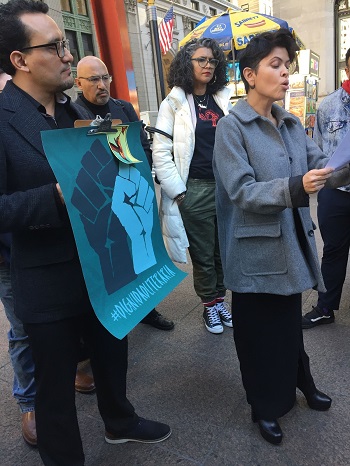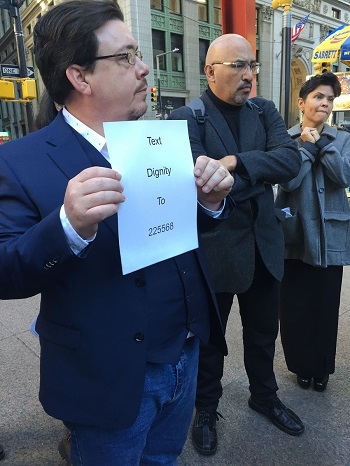#DignidadLiteraria and Macmillan Meet, Publisher Commits to More Latinx Representation
On February 3, representatives of Macmillan and its imprint Flatiron Books met with leaders of Latinx advocacy movements #DignidadLiteraria and Presente.org to discuss issues of inequity within the publishing industry that have come to the fore with the publication of American Dirt.
 |
(l.-r.) Matt Nelson, Roberto Lovado, Alicia Anabel Santos, and Myriam GurbaPhoto by Lisa Peet |
On February 3, representatives of Macmillan and its imprint Flatiron Books sat down in the Macmillan offices with leaders of Latinx advocacy movements #DignidadLiteraria and Presente.org to discuss issues of inequity within the publishing industry that have come to the fore with the publication and promotion of author Jeanine Cummins’s recent novel American Dirt.
The book, which was acquired for seven figures, blurbed by prominent authors such as Stephen King and Julia Alvarez, and selected by Oprah Winfrey for her book club, tells the story of a bookseller from Mexico who flees a drug cartel with her young son. However, members of the literary community have spoken out en masse against the book’s stereotypical treatment of Mexican immigrants and its lack of cultural accuracy—as well as the publisher’s substantial promotion of a book centering Latinx experience written by a white woman, when stronger and more authentic works by authors of color are not given similar backing, and sometimes struggle even to get published at all.
Over the course of two hours authors David Bowles, Roberto Lovato, and Myriam Gurba from #DignidadLiteraria, and Presente.org executive director Matt Nelson, spoke with Macmillan president Don Weisberg, Flatiron president Bob Miller, representatives from other Macmillan imprints, and a Macmillan publicist. Members of Winfrey’s team, representing her book club and O, the Oprah Magazine, called in. At the meeting’s end, the publisher had committed to increasing Latinx representation—not only among the authors and titles it publishes, but within the ranks of its staff as well.
Macmillan promised to develop an action plan within 90 days, and agreed to meet with #DignidadLiteraria and other Latinx groups in 30 days to assess progress and discuss the work so far.
Bowles called this “a clear victory.” At a press conference held afterward in Zuccotti Park, across from Macmillan’s Broadway offices, he told the assembled crowd, "Your voices were heard, the way you organized so quickly and so organically around our outrage and disappointment at the publishing industry for running roughshod over us, and for telling our stories not just in voices that are not our own but in ways that are disrespectful and inaccurate. We think this is a move in the right direction.” Bowles thanked Macmillan for reaching out and asking the coalition representatives to come to New York so they could sit down and talk.
#DignidadLiteraria, a coalition of Latinx writers, publishers, and academics, was originally established to organize Latinx writers in advance of the Association of Writers and Writing Programs (AWP) conference in March. After Gurba rebutted the initial spate of positive reviews for American Dirt in the online journal Tropics of Meta, however, and conversations around the book grew and intensified, the group decided to extend its movement into activism.
“We came not only to offer an olive branch to Flatiron,” said Gurba. “We came to offer our assistance in restoring the dignity of all parties harmed.”
A CALL TO ACTION
There is much work to be done within the publishing industry, Nelson noted, offering up some dismaying statistics: editorial staff at the big five publishers are 85 percent white, and only two percent Latinx. People of color make up 37 percent of the country’s population, with Latinx residents comprising half of that, yet less than three percent of the books published every year are by Latinx writers.
 |
(l.-r.) David Bowles, Roberto Lovado, and Myriam GurbaPhoto by Lisa Peet |
Over 15 years and 82 books, Oprah’s Book Club has never featured a Mexican or Mexican American author—and only two Latin American writers, Gabriel García Márquez and Isabel Allende, and one Haitian American, Edwidge Danticat.
“We have to make a stand,” Nelson said. “We have to fight not for representation, or diversity, or any of those hollow catchphrases that people keep using again and again—it's a Band-Aid to try to fix the situation. We have to fight for equity, for dignidad. And that's what we were trying to do today. We don't want hollow promises. We want real action.”
The conversation is not about any one book or author, said Lovato. “This is not about Jeanine Cummins. This is about us,” he emphasized. “Our fight is against the systemic racism and exclusion of the industry that created her, but also denying us the opportunity to tell our stories.”
In the coming weeks, Lovato said, 11 cities across the country (to be announced) would be mounting similar dialogues about the lack of representation in publishing, with more actions planned for AWP in San Antonio, TX. Anyone interested in hosting or attending an event is invited to text the word “dignity” or “dignidad” to 225568 for further instructions.
The coalition is also calling on New York Governor Andrew Cuomo to launch an investigation of underrepresentation in the publishing industry with the New York State Division of Human Rights.
“I'm confident in the power of the Latino community to step up and fight for its rights,” said Lovato. “Ultimately that is what's going to determine a game-changing shift in the publishing industry.”
Afro-Dominican writer and playwright Alicia Anabel Santos read a statement, noting, “We believe that the U.S. publishing industry must be held to a social and moral standard when it comes to acquiring stories written about people of color, with close attention being paid to how these stories are packaged.” Nuyorican poet and performer Caridad De La Luz read an original poem. And Gurba encouraged anyone with concerns to speak out, even if the prospect is frightening.
“I'm an itty bitty queer lady who teaches high school, and I spoke out against the publishing industry at the risk of potentially never being published again,” she said. “And I don't give a shit. If I need to, I'll put out zines. I'll write my next novel on a tortilla. I don't care. I'll do what it takes." Gurba noted that she was 5'-4" only because she was wearing three-inch heels, adding, "If a person this small and this quote-unquote insignificant can cause these many waves, so can you.”
“The Latinx community of the United States is on its way to entering the national conversation,” said Lovato. "We're just starting, but we're starting on the right foot—with a major concession from a global corporation that's proven, in our meeting, that they're serious about making serious structural and institutional change.”
RELATED
ALREADY A SUBSCRIBER? LOG IN
We are currently offering this content for free. Sign up now to activate your personal profile, where you can save articles for future viewing









Add Comment :-
Comment Policy:
Comment should not be empty !!!